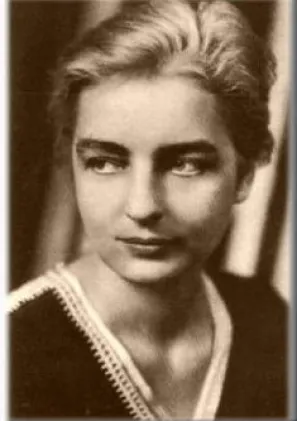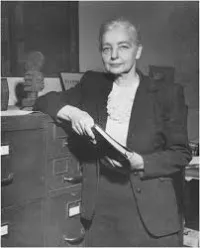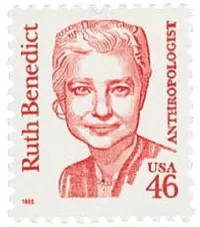Biography
1887 - 1948
"Racism is an ism to which everyone in the world today is exposed; for or against, we must take sides. And the history of the future will differ according to the decision which we make."
- Ruth Benedict
After completing her dissertation in 1923, Benedict began teaching at Columbia University where she met Margaret Mead, a Columbia student 15 years her junior. The two women fell in love and went on to profoundly influence each other’s work over the next 25 years. Benedict’s cross-cultural studies, observing Native American societies as well as people in Europe and Asia, asserted that society, not biology or nature, created the categories “normal” and “abnormal.” She believed that labeling a type of person “unnatural” – as medicine and society had labeled homosexuals – could lead to neurosis and even madness. Living at a time when there was no political movement to join, Benedict instead sought to change the intellectual climate of society by fighting anti-Semitism and, especially in the 1940s, racism. Her widely read tome Race: Science and Politics (1940) attacked time-honored, pseudoscientific notions of innate “racial characteristics,” including the linkage of race with IQ. Margaret Mead was with Benedict when she died of angina at the age of 61.
1887 - 1948
"Racism is an ism to which everyone in the world today is exposed; for or against, we must take sides. And the history of the future will differ according to the decision which we make."
- Ruth Benedict
After completing her dissertation in 1923, Benedict began teaching at Columbia University where she met Margaret Mead, a Columbia student 15 years her junior. The two women fell in love and went on to profoundly influence each other’s work over the next 25 years. Benedict’s cross-cultural studies, observing Native American societies as well as people in Europe and Asia, asserted that society, not biology or nature, created the categories “normal” and “abnormal.” She believed that labeling a type of person “unnatural” – as medicine and society had labeled homosexuals – could lead to neurosis and even madness. Living at a time when there was no political movement to join, Benedict instead sought to change the intellectual climate of society by fighting anti-Semitism and, especially in the 1940s, racism. Her widely read tome Race: Science and Politics (1940) attacked time-honored, pseudoscientific notions of innate “racial characteristics,” including the linkage of race with IQ. Margaret Mead was with Benedict when she died of angina at the age of 61.
Demography
Demography
Gender Female
Sexual Orientation Lesbian
Gender Identity Cisgender
Ethnicity Caucasian/White
Nations Affiliated United States
Era/Epoch First-wave Feminism (1848-1930)
Field(s) of Contribution
Academics
Author
Poet
Science
Social Justice
Commemorations & Honors
Benedict College in Stony Brook University Named After Benedict
American Academy of Arts and Sciences Fellow (1947)
Great Americans Series US Postage Stamp Released in Benedict's Honor (1995)
Posthumous National Women's Hall of Fame Inductee (2005)
Demography
Gender Female
Sexual Orientation Lesbian
Gender Identity Cisgender
Ethnicity Caucasian/White
Nations Affiliated United States
Era/Epoch First-wave Feminism (1848-1930)
Field(s) of Contribution
Academics
Author
Poet
Science
Social Justice
Commemorations & Honors
Benedict College in Stony Brook University Named After Benedict
American Academy of Arts and Sciences Fellow (1947)
Great Americans Series US Postage Stamp Released in Benedict's Honor (1995)
Posthumous National Women's Hall of Fame Inductee (2005)
Resources
Resources
Caffrey, Margaret M. Ruth Benedict: Stranger in This Land. Austin: University of Texas Press, 1989.
Banner, Lois W. Intertwined Lives: Margaret Mead, Ruth Benedict, and Their Circle. New York: Knopf, 2003.
Lapsley, Hilary. Margaret Mead and Ruth Benedict: The Kinship of Women. Amherst, Mass.: U of Massachusetts, 1999.
http://en.wikipedia.org/wiki/Ruth_Benedict
http://www.nndb.com/people/786/000097495/
http://en.wikipedia.org/wiki/Margaret_Mead (mentions Benedict)
http://www.brainpickings.org/2013/10/23/margaret-mead-ruth-benedict-love-letters/
Resources
Caffrey, Margaret M. Ruth Benedict: Stranger in This Land. Austin: University of Texas Press, 1989.
Banner, Lois W. Intertwined Lives: Margaret Mead, Ruth Benedict, and Their Circle. New York: Knopf, 2003.
Lapsley, Hilary. Margaret Mead and Ruth Benedict: The Kinship of Women. Amherst, Mass.: U of Massachusetts, 1999.
http://en.wikipedia.org/wiki/Ruth_Benedict
http://www.nndb.com/people/786/000097495/
http://en.wikipedia.org/wiki/Margaret_Mead (mentions Benedict)
http://www.brainpickings.org/2013/10/23/margaret-mead-ruth-benedict-love-letters/


